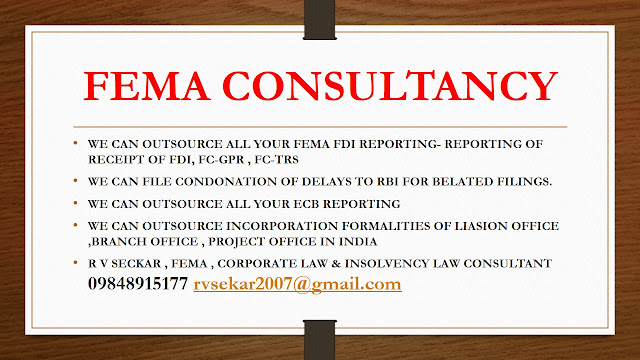Reporting
of FC-TRS (Transfer of shares) through online through E-Biz Portal
Description:-
Foreign
investors can invest in Indian companies by purchasing / acquiring existing
shares from Indian shareholders or from other non-resident shareholders.
General permission has been granted to non-residents / NRIs for acquisition
of shares by way of transfer in the following manner.
1. Transfer of shares by a
Person resident outside India
a.
Non-Resident to Non-Resident (Sale / Gift)
Note: Transfer of shares from or by erstwhile OCBs would require prior
approval of the Reserve Bank of India.
b. NRI to NRI (Sale / Gift)
c. Non-Resident to
Resident(Sale / Gift)
Note: Transfer of shares from a Non-Resident to Resident other than
under SEBI regulations and where the FEMA pricing guidelines are not met
would require the prior approval of the Reserve Bank of India.
2. Transfer of
shares/convertible debentures from Resident to Person Resident outside India
3. Transfer of Shares by
Resident which requires Government approval
4. Prior permission of the
Reserve Bank in certain cases for acquisition / transfer of security
5. Escrow account for transfer
of shares
i.
The actual
inflows and outflows on account of such transfer of shares shall be reported
by the AD branch in the R-returns in the normal course.
ii.
Reporting
of transfer of shares between residents and non-residents and vice- versa is
to be made in Form FC-TRS. The Form FC-TRS should be submitted to the AD
Category I bank, within 60 days from the
date of receipt of the amount of consideration. The onus of submission of the Form FC-TRS within the
given timeframe would be on the transferor / transferee, resident in India.
You can download the copy of the FC-TRS from the following link:
iii.
The sale
consideration in respect of equity instruments purchased by a person resident
outside India, remitted into India through normal banking channels, shall be
subjected to a KYC check (Annex 9-ii) by the remittance receiving AD
Category- I bank at the time of receipt of funds. In case, the remittance
receiving AD Category- I bank is different from the AD Category - I bank handling
the transfer transaction, the KYC check should be carried out by the
remittance receiving bank and the KYC report be submitted by the customer to
the AD Category -I bank carrying out the transaction along with the Form FC-TRS.
iv.
The AD
bank should scrutinize the transactions and on being satisfied about the
transactions should certify the form FC-TRS as being in order.
v.
The
transferee/his duly appointed agent should approach the investee company to
record the transfer in their books along with the certificate in the Form
FC-TRS from the AD branch that the remittances have been received by the
transferor/payment has been made by the transferee. On receipt of the
certificate from the AD, the company may record the transfer in its books.
In case of
transfer of shares by way of sale from resident to non-resident/ non-resident
to resident, the resident transferor / transferee / Investee Company/ NRI
transferor / Non Resident transferor should file FC-TRS within 60 days from
receipt of funds
In terms of Section 2 (ze) of Foreign Exchange
Management Act, 1999 "Transfer" includes sale, purchase, exchange,
mortgage, pledge, gift, loan or any other form of transfer of right, title,
possession or lien.
Please
click on the link "Master Circular for Foreign
Investment in India"for further information on Foreign
Investments in India issued by RBI
Prerequisites:-
Before
reporting the transaction, applicant needs to obtain following documents in
soft copy:
Payment Details:-
There is
no payment required to avail this service on eBiz.
Service Window:-
Applicant
can apply for Reporting of FC-TRS at any time of the year.
Processing Steps:-
Application,
once submitted will flow through following status before request is
completed. Applicant can use this information to track status of his
application.
1.
Submitted
2.
Resubmission
Required*
3.
Application
Approved
4.
Application
Rejected*
5.
Clarification
Required*
Note:
Items marked with * are states in certain exception flows. Your application
may not necessarily pass through these states during processing.
Department
Foreign Exchange Department
Reserve Bank of India (www.rbi.org.in)
Contact Department
Address: Reserve Bank of India, Central Office Fort Mumbai - 400 001 India
Telephone Nos: +91 22 -
22601000
Fax: +91 22 - 22665330 Website Address: www.rbi.org.in |
After submitting FCGPR thru ebiz portal, RBI can raise the following queries:
1) RBI need the acknowledgment letter for UIN generated thru ebiz portal, even though there is no mandatory field to attach the same. In case of multiple tranches of inward remittance, take print out of all acknowledgment and then scan it in one pdf file. There is only one additional option for attachment (apart from mandatory attachment) so if u received money in three tranches, u can attach only one acknowledgement if u r planning to attach acknowledgement separately for each tranches (after filing advance reporting).
2) RBI do ask for clarification that the conversion of Preference Shares or Debentures will not take place below value price as per valuation report. In that case, certificate required from company means that company need to give declaration and not any kind of certificate to be issued.
3) Whenever RBI ask for certificate from PCS and from Company for any clarification, it means only certificate to be issued by PCS and company need to give declaration.
Compliance pertaining to notice / mail received from RBI is much Important.














